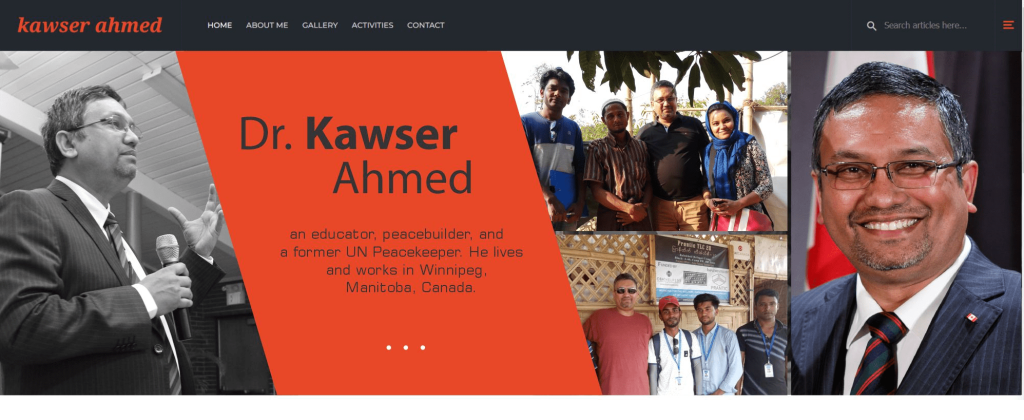KAWSER AHMED
Teaching Philosophy

The essence of peace and conflict studies is the collaborative and creative engagement of all stakeholders in the desire for cessation of conflict (including international conflicts). Hence, good teaching in this area must rely on that kind of engagement to help students develop skills in critical thinking and creative problem-solving. I have developed an understanding of such a teaching philosophy because I have participated in conflict resolution, transformation, and management in various capacities in my professional life. This includes my experiences as a UN peacekeeper and a member of the faculty in armed forces institutions. I also believe that “on-the-ground” experience enriches one’s theoretical understanding of conflict (including international conflicts) and helps to get students motivated; there is nothing like real life examples to stimulate critical thinking and eventually help students find practical solutions to a problem. Knowledge building is best done as a collaborative effort, and I always try to juxtapose examples of conflicts and conflict transformation along with existing theories. This helps students to contribute their own stories of conflict transformation and thus combines more than one knowledge source.
I taught undergraduate and graduate level courses on terrorism, counter-terrorism, CVE, and political violence at defence institutions in Bangladesh. I was particularly involved in preparing and offering graduate level courses on theories of international relations, conflict analysis and transformation, inter-group dialogues, and non-violent crisis prevention (with particular emphasis on community focused intervention). I adopted a three-pronged approach while teaching graduate courses: one, orientation and a clear understanding of existing literature and theories on the subject matter; two, discussion on available case studies and examples; and three, application of knowledge in a simulated scenario followed by evaluation. My rationale of adopting such an approach is based on my belief that a graduate level student in peace and conflict studies should be equipped not only with requisite knowledge on the causes of conflict but he/she should also be able to develop creative conflict intervention models. The very nature of peace and conflict studies underpins the fact that conflict does not occur in a vacuum; hence, neither do the resolution or transformation efforts. In this way, the knowledge of conflict and conflict intervention is co-created by active partnering with students. I personally feel enlightened when I get engaged in critically evaluating conflict resolution/transformation models with students as it brings out the originality, creativity, and passion of the students; these elements make my teaching a lively enterprise. I also collaborate in research with students, especially those who aspire to work on community-based conflict intervention.
My ultimate goal in teaching is to provide resources to the students so that they are better informed and equipped for achieving their overall goals as global and local leaders. I am a firm believer in the human learning potential; as such, my whole endeavour is geared to trigger the imagination of the students within the span of a semester. I believe that the learning process must not end at the end of a semester; rather, it must continue into the future, enabling a student to build upon the previous course. For this reason, I set out my goals at the beginning of the semester (depending on the graduate or undergraduate level) and ask all the students to keep this in their folders and I check back periodically and also at the end to evaluate whether these goals have been achieved. I also set a few benchmarks to quantify the goals and modify them for the next semester. In the end, I try to remain sensitive to the ever-changing context of teaching and learning so that adjustments can be made as necessary. In this regard, I utilize information technology for further engagement and sharing and for devising teaching modules related especially to conflict and conflict transformation methods. I would like to improve upon my teaching ability by incorporating the power of technology and by constantly modifying my method of delivery.
